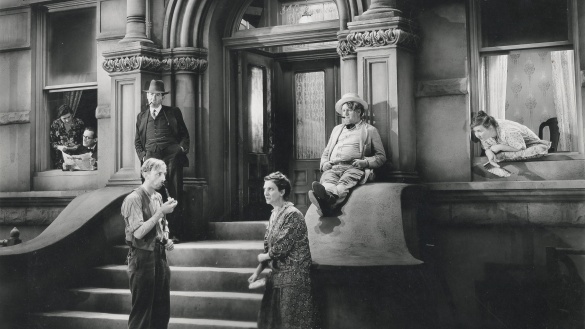– Street Scene is the movie for the weekend. In this section every Saturday or Sunday Celluloid Dimension picks a movie for the weekend. The selections are preferably underrated movies or neglected movies that we think should get more attention. Have fun with these recommendations. –
![]()
Street Scene (1931) Directed by King Vidor
A slice of 1930’s Americana that condenses in its frugal scenography a plethora of sociopolitical issues inherent in Western society into a lean running time of no more than 75 minutes or so. I cannot think of any other man better suited to carry out a story with these sociological characteristics than King Vidor, a specialist in translating melodrama as realism. And this neglected pre-Code production of 1931 is a monumental paradigm of Vidorian realism; easily one of his most adventurous, even experimental, endeavors. The film takes as its dramatic basis the 1929 play of the same name about the daily lives of some neighbors living in a tenement building on the Lower East Side. The entire plot takes place in the same spatial unit -also temporal, though it does not follow the transition of the day with chronological fidelity- on the front stoop of the building; the staging patterns here are quasi-theatrical.
In essence, the framing of the story does not betray the dramaturgical proscenium, but rather integrates it into the motion picture praxis with functional interchangeability. With a great sense of acting collectivity and audiovisual kineticism, the first act of Street Scene introduces its characters in its singular scenario during a sweltering summer that forces this neighborhood community to prefer to be outside the building rather than inside. Basically, in this initial section we see a group of people gossiping about their neighbors’ lives and grumbling about the scorching weather. Also participating in this entertaining colloquy is Beulah Bondi playing a biased and meddlesome woman who is as venomous as she is hypocritical. Also joining in from an open window is the Jewish Kaplan family. The Kaplan patriarch is an amiable but loquacious Marxist who does nothing but profess his pro-Bolshevism in discussions of the socio-economic context. With eerie precision, this unique setting congregates a large ensemble of characters that typifies the worst and the best of America.
It is a film with participatory qualities, where the audience can see themselves reflected in some of these characters, thus stimulating introspection. During the many gossips we hear in the ordinary conversations of these neighbors there is one that will eventually become the gravitational fulcrum of the plot and the vicissitude that will foreshadow the tragedy of its determinism. Estelle Taylor plays a housewife who lives in fear of her strict, narrow-minded husband (David Landau), who all he does when he comes home after a hard day’s work is to reprimand and criticize his wife. She only seeks respect and to be loved. Her daughter, the sweet and delicate Rose played masterfully by Sylvia Sidney understands her mother’s melancholy; unlike her stern father, Rose is empathetic with her mother. Infidelity inevitably comes to the fore, especially when we learn that Rose’s mother is having a surreptitious liaison with one of the neighbors. It is here that the values of this drama begin to shift towards its more doleful depths.
The film plunges into the characters’ anguished desire to flee from the fatal premonitions that await them. However, although the sexist, chauvinistic and antiquated ethos may be seen as distasteful today, there are also ideals that remain timeless, such as its compassionate humanism, its forthright condemnation of social prejudice and its unrestricted empathy for the working class. I really didn’t think that a film with such a hermetic and conversational system could have left such an overwhelming impact on me, but it did. The scrupulous method in which Vidor unveils with deep focus the fallibilities of our society is admirable, and his colossal magnanimity in giving voice to the marginalized is equally commendable. Probably the most poignant thing about this succinct but rich film is its formidable valiance in capturing melodrama at its most visceral without losing a sense of realism; the camera is unflinchingly sharp and indiscreet, unafraid to depict both the beauty and the horrors of life.

